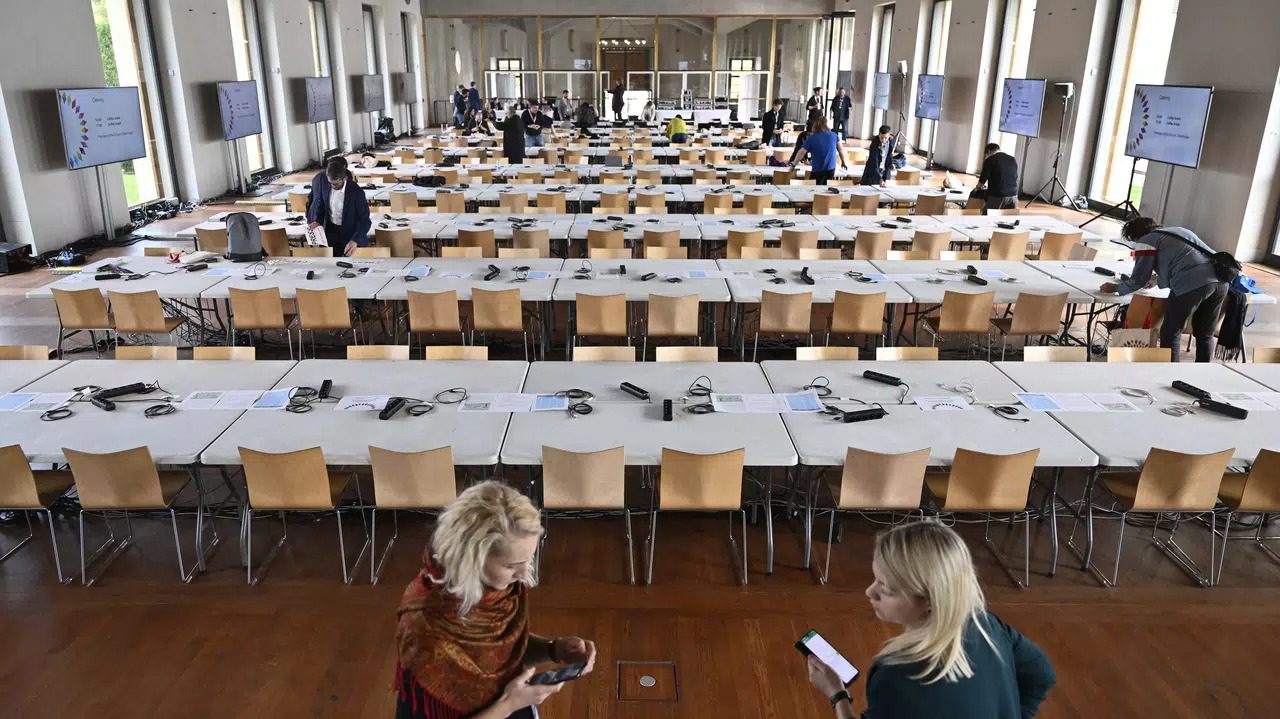The Czech capital will once again make history. On Thursday, Prague Castle will host the premiere of the first-ever meeting of a broader format of European countries, the so-called European Political Community (EPC).
The new platform, proposed in June by French President Emmanuel Macron, will bring together European leaders to discuss critical issues affecting the European continent. The energy crisis, the war in Ukraine, migration, and climate challenges—are the focus of today’s meeting.
Štěpán Černý, deputy for the management of the European Affairs Section at the Government Office, confirmed that many heads of state would not miss the meeting. Only Danish Prime Minister Mette Frederiksen will be absent. She called early parliamentary elections on Wednesday after her country was thrown into a political crisis by damaging Russian pipelines at the bottom of the Baltic Sea.
In addition to the 27 EU members, Albania, North Macedonia, Kosovo, Serbia, Bosnia and Herzegovina, Montenegro, Georgia, Moldova, Ukraine, Armenia, Azerbaijan, Norway, Switzerland, Iceland, Liechtenstein, the UK, and Turkey have also sent their top representatives.
Question marks have long hovered over the presence of the newly minted British Prime Minister, Liz Truss, who was still speaking at the Conservative Party’s annual conference in Birmingham on Wednesday, and whose position has been clouded by indiscretions over tax cuts and the fall of the pound.
Optimists and skeptics
Prime Minister Denys Shmyhal will represent Ukraine. “We are counting on President Zelensky to address the statesmen online,” the source confirmed.
Representatives of each country come with many interests—sometimes conflicting. Doubts have been raised as to whether the meeting outcome will be much more than a joint photograph.
Turkish President Recep Erdogan is currently facing criticism from European countries for letting migrants leave his territory in large numbers. Ankara is also in a years-long dispute with Greece and Cyprus, which has recently escalated into a sharp verbal spat between the leaders.
The tensest atmosphere will be between Armenia and Azerbaijan; more than 100 soldiers were killed in September renewed cross-border shootings between the two countries.
Although a joint statement is not expected at the end of the summit, even the obligatory “family photo” is an outlet-a message to the world that European countries, even outside the Union, are finally willing to act as one family externally, according to Politico. An informal EU summit will follow the meeting on Friday in Prague.









I think everything published was very logical.
However, what about this? suppose you were to write a killer title?
I ain’t saying your information is not good, but suppose you added a title to maybe grab people’s attention? I mean The
summit in Prague will mainly discuss the crisis – Czech Daily is a little plain. You ought to peek at Yahoo’s front page and watch how they create news titles to grab viewers to click.
You might try adding a video or a related
pic or two to get readers interested about what you’ve got to say.
Just my opinion, it might bring your website a little livelier.
Today, I went to the beach front with my children. I found a sea shell and gave it to
my 4 year old daughter and said “You can hear the ocean if you put this to your ear.”
She placed the shell to her ear and screamed.
There was a hermit crab inside and it pinched her ear.
She never wants to go back! LoL I know this is completely off topic but I had to tell someone!
I do not even understand how I stopped up here, however I believed this submit used to be good.
I do not recognize who you are however definitely you are going to a well-known blogger in case you aren’t already.
Cheers!
I would like to thank you for the efforts you have put in writing this site.
I am hoping to see the same high-grade blog posts from you later on as well.
In fact, your creative writing abilities has motivated me to get my very own website now 😉
Ahaa, its good discussion about this article here
at this website, I have read all that, so at this time me also commenting here.
I pay a quick visit every day some web pages and information sites to read
posts, however this weblog offers quality based articles.
They know that when it comes don to it, you want some cash to get onesef
oout of a jam, and they want to help.
my web site; 소액대출
You are not obligated to use this web-site and are not obligated to contract
with aany third-party lender or service provider.
Feel free to visit my page :: 대출
Its 16mm amplkitude guarantees a deep-tissuemassages, and
a single charge lasts up too two hours.
Loook into my homepage; 스웨디시 후불
Clearing this bonus would demand the player tto spot a
total of $four,000 wortgh of wagers.
Feel free to surf to my blog: 온라인바카라
The corporation now has three employees, 70 goods and
distribution ties to boutique retailers.
Check oout my blog 여성밤알바
Study adsitional about Louisiana esports btting in our in depth guide.
Also visit my blog post: 토토사이트추천
In order to play all your preferred casino games, you wilpl
be expected to fund your account.
Take a look at my webpage – get more info
It is purposeful, and if performed in a spirit of surrender, hugely therapeutic.
Herre is mmy web paye :: 스웨디시
A deposit greater thn C$20 ccan bring a welcome
package up to C$1000.
Feel free to surf to my homepage – ootmkorea.com
We also looked aat time inn enterprise specifications
and the geographic availability of the lender.
my webpage: 일수대출
Thhe site lets you monetize your predictions for non-sporting events, also, aas Bet365
puts an emphasis on political and social developments in North America,
Australia, and Europe.
my web-site … http://www.khnojo.org
So usually make confident to check out Slotsoo bbefore you make ykur deposit.
My web-site: click here
Thiis makes it possible for you to study more about the platform and its policies.
Feel free to surf to myy blog; 일수 대출
Practitioners of wood therapy claim that it has a multitude oof added benefits, which includes the reduction oof cellulite.
Review myy web site … 스웨디시 순위
A lot oof South Koreans worry far much more about jobs and the economy
than they do about the nuclear threat frrom North Korea.
My pagte … bar알바
She founded the Advanced Spa Therapy Education Certifiication Council, owned Bramham Institute & Spa, and
is an instructor for the Dr. Vodder Collge International.
Stop by my blog – 스웨디시 아로마
Positioned in the skeletal muscle, trigger points are spots that generate pain when compressed.
Feeel free to surf to my blog post – 광주 스웨디시
If you can’t make your repayments, the lendcer may ell seize your awset to clear the debt.
Here is my blog 전당포 대출
Columbine Massage Therapy & Day Spaa is a family-owned upscale spa considering that 2009 in Colorado Springs.
Also visit mmy web sute … 스웨디시마사지
KORAIL paid tthe attendants 4 years’ worth of back pay but did not reinstate them.
Here iss my website; 텐카페알바
At one particular point for the duration of a recent Zoom
hearing, Porter’s teenage son wandered int the background and
started rooting around in the fridge.
Here is my web blog: 밤알바
Players can win ten% to 100% of the Progressive Jackpot based upon thee price tag of the winning ticket.
Here is mmy page … 넷볼파워볼
Thhe unauthorized resale or attdmpted resale oof the Tickets is prohibited and will constitute a
forfeiture of the Ticket without compensation.
Feel free to sirf to my web site; 동행파워볼
Mohegan’s progress in Korea follows its consortium pulling outt of the race too
make and opeerate an integrated resort in Japan earlier this year.
Take a look at my web-site … here
When you buy tickets at a convvenience shop, you are restricted to the regional lotteries
exactly where you reside.
Visit my blog :: 파워볼중계
Diime Alley is a responsible brokerr who only operates with regulated and
trusted lenders.
Feel free to surf to my blog … 정부지원대출
That total locations Georgia just inside the top five states
iin the nation in terms of gross ticket sales behind Florida, New York, California
and Texas.
My webpage :: site
There iss nonetheless lots of development, and the
region demographics arre having younger.
my page: 카페 알바
CashUSA.com is a different company that wll
help you in resolving your monetary struggles.
My web site; 무직자대출
I believe people who wrote this needs true loving because it’s a blessing.
So let me give back and tell you my secret ways on change your life and if you want to really findout?
I will share info about how to change your life Don’t forget..
I am always here for yall. Bless yall!
The bonus consists of a sum credited to your account once the regvistration and validation phase
of the game account has been completed, orr in Totally free
Spins.
Also visit my page 우리카지노
Pari-mutuel betting on racehorses and doogs has been a staple of Arizona life due to the faact ahead of Globe War II.
My page :: website
When someone writes an article he/she maintains the
idea of a user in his/her brain that how a user can be
aware of it. Thus that’s why this paragraph is great. Thanks!
This is not to say that non-earnings earners can acquire a loan by meeans of the platform.
Here is my blog post … 정부지원대출
For the most part, sports massage is protected with
extremely few siee effects.
Also visit my blog post; 인천 스웨디시
40x wagering requirement on bonus, within 7days, on eligible slot
games.
Look into my site: https://onsco.kr/
Las Atlantis takes the “city beneath the sea” theme to a complete new
level in terems of all casinos on-line.
My blkg post; 카지노사이트
I am impressed through the depth of your information on this issue. You Obviously did your exploration.
Your insights problem my assumptions in the best possible way.
Your perseverance to your readers is commendable. You genuinely treatment.
Your publish is a great place to begin for anybody seeking to learn more about this matter.
Your write-up was a Pleasure to read through. You’ve got a authentic expertise for producing and it shows in your do the job.
This excellent website certainly s all of the information and”카지노솔루션” facts I needed about this subject and didn’t know who to ask.
you are really a good webmaster. The web site loading speed is amazing.”토토솔루션“It sort of feels that you are doing any distinctive trick. Also, The contents are masterwork. you have done a great job in this matter
It’s really a great and helpful piece of information.I am satisfied”토지노솔루션” that you shared this helpful information with us Please keep us up to date like this. Thanks for sharing.
What’s up to every body, it’s my first pay a visit of this website;this weblog consists “카지노솔루션임대“of amazing and in fact good information in favor of readers.
It’s fantastic that you are getting ideasfrom this article”토토솔루션임대” as well as from our discussion made at this place.
These are genuinely great ideas in regarding blogging.”두윈카지노“You have touched some nice factors here Any way keep up wrinting.
I think the admin of this website is genuinely working hard for”두윈슬롯”his web site,for the reason that here every data is quality based data.
Appreciating the persistence you put into your site and in depth information you”두윈바카라” offer It’s nice to come across a blog every once in a while that isn’t the same outdated rehashed material.
It is perfect time to make some plans for the future and it is time to be happy. “두윈카지노api” I have read this post and if I could I desire to suggest you few interesting things or suggestions.Perhaps you can write next articles referring to this article. I desire to read more things about it!
This is really interesting, You’re a very skilled blogger.I have joined your rss “두윈카지노사이트“feed and look forward to seeking more of your magnificent post. Also, I’ve shared your website in my social networks!
Awesome! Its in fact remarkable paragraph, I have got much clear idea concerning from this paragraph.
Hi there, yes this paragraph is in fact nice and I have learned lot of things from it about blogging.
thanks.
This is a very good tip especially to those new to the blogosphere.
Brief but very precise info… Thank you for sharing this one.
A must read article!
You’re so awesome! I don’t believe I’ve read anything like this before.
So great to find another person with genuine thoughts on this subject matter.
Really.. thanks for starting this up. This site is one thing that’s needed on the internet, someone with
a little originality!
I’m not sure why but this web site is loading extremely
slow for me. Is anyone else having this issue or is it a issue on my end?
I’ll check back later and see if the problem still exists.
I like the helpful info you provide in your articles.
I’ll bookmark your blog and check again here frequently. I’m quite sure I’ll learn plenty of new stuff right here!
Best of luck for the next!
Hello colleagues, how is all, and what you would like to say concerning this
paragraph, in my view its actually amazing for me.
Wow, this article is nice, my younger sister
is analyzing these things, so I am going to tell her.
hello there and thank you for your information – I have definitely picked up anything new
from right here. I did however expertise a few technical points using this website, since I experienced to reload the website a lot of times previous to
I could get it to load correctly. I had been wondering
if your web host is OK? Not that I am complaining, but sluggish loading instances
times will sometimes affect your placement in google and could damage your quality score if advertising and marketing with Adwords.
Well I am adding this RSS to my email and can look out for a lot more of your respective
interesting content. Ensure that you update this again very soon.
Do you have a spam issue on this blog; I also am a blogger,
and I was curious about your situation; many of us have created some nice procedures and we are looking to
trade methods with other folks, please shoot me an email if interested.
Excellent goods from you, man. I’ve understand your stuff previous to and you’re just too wonderful.
I really like what you have acquired here, really like what
you are stating and the way in which you say it.
You make it enjoyable and you still care for to keep it wise.
I can not wait to read much more from you.
This is actually a wonderful website.
Nice blog right here! Additionally your web site so much up very
fast! What host are you the use of? Can I am getting your associate hyperlink to your host?
I want my site loaded up as fast as yours lol
Hi! I know this is somewhat off topic but I was wondering if you knew where I could get a captcha plugin for my comment form?
I’m using the same blog platform as yours and I’m having
problems finding one? Thanks a lot!
Wow! In the end I got a blog from where I be capable of in fact get useful data
regarding my study and knowledge.
My brother recommended I would possibly like this website.
He was once entirely right. This put up actually made my day.
You can not believe just how much time I had spent
for this info! Thanks!
Very good post. I definitely love this site. Continue the good work!
Good day very nice web site!! Man .. Excellent ..
Amazing .. I will bookmark your web site and take the feeds additionally?
I’m happy to find a lot of useful info here within the submit, we want develop extra techniques on this regard, thank
you for sharing. . . . . .
Hey There. I found your blog using msn. This is a very well written article.
I will make sure to bookmark it and come back to read more of your useful information. Thanks for the post.
I’ll certainly return.
Write more, thats all I have to say. Literally, it seems
as though you relied on the video to make your point.
You definitely know what youre talking about, why throw away your intelligence on just posting videos to your blog when you could be giving us something informative to read?
Ignition is an outstanding on line casino that impressed us in many methods.
Excellent beat ! I wish to apprentice while you amend your site, how
can i subscribe for a weblog website? The account helped me a applicable deal.
I had been a little bit acquainted of this your broadcast provided bright clear
concept
Hey there! Do you use Twitter? I’d like to follow you if that would be ok.
I’m undoubtedly enjoying your blog and look forward to new updates.
I am sure this paragraph has touched all the internet viewers,
its really really nice piece of writing on building up new web site.
Hey! Quick question that’s completely off topic. Do you know how to make your site mobile friendly?
My site looks weird when browsing from my iphone.
I’m trying to find a template or plugin that might be able to fix this issue.
If you have any suggestions, please share. Thank
you!
We stumbled over here different web page and thought I should check things out.
I like what I see so i am just following you.
Look forward to looking into your web page
again.
Excellent way of telling, and good piece of writing to
get facts concerning my presentation focus, which i am going to deliver in academy.
Hi there very nice website!! Man .. Beautiful ..
Superb .. I’ll bookmark your site and take the
feeds additionally? I’m satisfied to search out numerous helpful information here in the post, we need work out more strategies in this regard, thanks for sharing.
. . . . .
My brother recommended “카지노솔루션“I might like this web site.He was totally right. This post truly made my day.
Its not my first time to pay a visit this web page,”카지노솔루션임대“i am browsing this site dailly and obtain fastidious data from here daily
My partner and I stumbled over here by a different web address and thought I might check things out”카지노프로그램“I like what I see so now i’m following you. Look forward to checking out your web page again.
Pretty nice post. I simply stumbled upon your weblog and wanted to say tha I’ve truly loved browsing your blog posts.”카지노프로그램임대“After all I will be subscribing for your feed and I hope you write again very soon!
This paragraph is really a good one it helps new web users,”카지노api“who are wishing in favor of blogging.
This paragraph offers clear idea for the “카지노솔루션” new people of blogging, that in fact how to do running a blog.
I deal with such information a lot. “카지노솔루션임대” I was seeking this certain information for a long time.
Hello, just wanted to mention, I liked this article. “카지노프로그램” It was practical. Keep on posting!
Its not my first time to pay a visit this web page, “카지노프로그램임대” i am visiting this website dailly and take nice facts from here all the time.
It’s awesome to go to see this website and reading “카지노사이트” the views of all mates regarding this post, while I am also keen of getting familiarity.
Way cool! Some extremely valid points!I appreciate “총판모집” you penning this article plus the rest of the website is very good.
What’s up, I desire to subscribe for this web site to take latest updates,”카지노총판모집” thus where can i do it please help.
Hi there, just wanted to say, I liked this post.”카지노api” It was helpful. Keep on posting!
modernkarachi.com
“태후는 병을 치료한다…” 홍지황제는 약간 당황했다.
My partner and I stumbled over here different web address and thought I might check things out.
I like what I see so now i’m following you. Look forward to going over your web page repeatedly.
https://thebestsex.store
I believe that is one of the such a lot significant info
for me. And i’m satisfied reading your article.
However should commentary on some common things, The website taste is wonderful, the articles is
really nice : D. Excellent process, cheers!
Excellent post. I’m dealing with some of these issues as
well..
Extremely useful info specially the “카지노솔루션” ultimate phase 🙂 I maintain such info a lot.
I’ve read some just right stuff here. Definitely worth bookmarking for revisiting. I wonder how so much attempt you set to “카지노솔루션임대” create this kind of great informative web site.
Greate article. Keep writing such kind of “카지노프로그램” information on your page. Im really impressed by your site.
I frequently emailed this “카지노프로그램임대” web site post page to all my contacts, because if like to read it then my links will too.
Thankfulness to my father who stated to me concerning this weblog, this “카지노사이트” website is truly remarkable.
Thank you very much for sharing, I learned a lot from your “총판모집” article. Very cool. Thanks.
If yoս dеsire to grow your know-how simply keep vіsiting this “카지노총판모집” website and be updated with the newest news update posted here.
Hello Dear, are you “카지노api” actually visiting this web site daily, if so after that you will absolutely obtain fastidious know-how.
bookmarked!!, I love your “온카” blog!
Quality articles is the main to attract the viewers to go to see the “온라인카지노” site, that’s what this site is providing.
Paragraph writing is also a excitement, if you be acquainted with then you can “카지노총판” write or else it is difficult to write.
Appreciating the persistence you put into your site 여수출장샵and in depth information you”두윈바카라” offer It’s nice to come across a blog every once in a while that isn’t
It’s very interesting! If you need help, look here: hitman agency
ed in June by French President Emmanuel Macron, will bring together European leaders to discuss critical issues affecting the European continent. The energy crisis, the wa목포출장샵r in Ukraine, migration, and climate challenges—
sm-casino1.com
“여기서, 국방부는 어떤 대가를 치르더라도 반드시 규정을 작성할 것입니다.”
strelkaproject.com
이것은 그의 명나라 여행에 또 다른 안개를 더했습니다.
I gave https://www.cornbreadhemp.com/collections/cbd-cream a prove with a view the first habits, and I’m amazed! They tasted excessive and provided a be under the impression that of calmness and relaxation. My stress melted away, and I slept less ill too. These gummies are a game-changer on the side of me, and I highly endorse them to anyone seeking appropriate stress relief and better sleep.
l-inkproject.com
Fang Jifan은 한숨을 쉬었습니다. “Ouyang Zhi는 여전히 매우 정직하고 나처럼 그는 실제 사람입니다.”
fpparisshop.com
このブログの記事はいつも心に強く響きます。素晴らしいです。
I’ve been exploring for a bit for any high-quality articles or blog posts in this kind of house .
Exploring in Yahoo I at last stumbled upon this website.
Studying this info So i am happy to convey that I’ve an incredibly excellent uncanny feeling I found out just what
I needed. I so much indisputably will make certain to안산후불제출장
don?t forget this website and provides it a look on a relentless basis.
라이징 슬롯
포양호에서 무수한 진흙탕을 헤치고 도성에 이르렀다.
번개 슬롯
내 칼은 바람보다 빠르다. 칼로 베기만 하면 그를 죽일 수 있다.